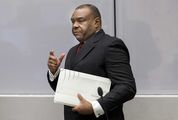BRIAN Molefe is CEO of Eskom.
BUSINESS DAY TV: Eskom says it’s made significant strides on its past operational and financial stability, and numbers for the six months to September back this up with net profit up 22% and an improving debt profile.
So why the need to apply for additional tariff hikes next year and how much of this is due to equity injections from government? CEO Brian Molefe joins us now on News Leader.
Brian, you’ve been in the job for close on a year now, full time since September...is this about perceptions that things are looking better on the surface but underneath there are still lots of problems to solve at Eskom?
BRIAN MOLEFE: There are still lots of problems to solve at Eskom. We’re not out of the woods with load shedding and we won’t be until Unit 5 of Medupi is delivered. But under the circumstances we are doing our best to manage the ship financially as well as from an operational point of view. And we’ve had some successes with 107 days of no load shedding or only two hours and 20 minutes of load shedding, and with the financial results that we have released today.
BDTV: If you talk about the results you released today, for any other company they look pretty damn good. Your net profit is up 22%, you run an Ebitda (earnings before interest, taxes, depreciation and amortisation) margin of 28%, so in the context of those kinds of numbers why do you need to apply for extra tariff hikes?
BM: The tariff hike is not really a tariff hike that we’ve applied for, the RCA (Regulatory Clearing Account). You will know that in terms of the rules, we apply for a tariff and the regulator grants tariffs and after some period in the future, we then go back to the tariff that was granted. In this case it was the year 2013-14 and the regulator determines whether the tariff was enough or whether the tariff was too little or too much. If it was too much then the regulator claws back from us. If it was too little we claw back from the regulator. So the R22bn that we’ve just applied for now is a clawback from 2013-14.
BDTV: But you don’t seem to need it...
BM: We do need it because we borrowed that money that we used, the R22bn...So it was borrowed and needs to be paid back.
BDTV: Why do you have this big under-recovery, is this because of using the gas turbines?
BM: We have big under-recoveries probably because at the time when the tariff was granted there are a lot of complaints of it being too high and so on and so forth and yet that is what we need. And so this subject...the regulator showing that it is prudent shows that this was actually what we needed in 2013-14.
BDTV: If we look at the profits that you’re making, how much is it then money that is used to invest in the business and then pay back the debts that you’ve taken out?
BM: The profits that we’re making at the moment are just a different management of certain things...for example we had made a big provision for a penalty in terms of take-or-pay contracts for the coal that was supposed to be delivered for the delayed coal stations at Kusile and Medupi. We’re dealing with that penalty differently now. We have decided we’re not going to pay a penalty we’re going to reduce the provision for the penalty. We’re not going to take the penalty, we’re going to pay for the coal and take it and stack it somewhere and so we would rather buy the land to keep the coal until we can use it rather than pay the penalty. And so just that decision alone has huge implications for our bottom-line profits.
BDTV: Your balance sheet is also looking a lot better, so debt to equity is down, gearing is down to 60%. How much of this is really just due to the government pumping more equity into Eskom though, because you’ve had R10bn, you’re getting another R13bn. Will you continue to increase the equity at government’s expense?
BM: No, we’ve received R10bn, we’re getting the R13bn but over and above that, government has converted R60bn of what was a loan from the government into equity, so...
BDTV: Government is the sole shareholder though.
BM: Government is the sole shareholder but it changes the balance sheet quite significantly and that is why you see the debt to equity and the gearing improve so much.
BDTV: And what are you going to do about your debtors? If you look at your debtors’ book you’ve got R32.26bn outstanding, R9.76bn of that is Soweto and more than 60 days outstanding is R9.2bn. This could be a huge plug for Eskom. What are you going to do about this?
BM: The long-term solution is prepaid...
BDTV: But that seems to be met with lots of resistance.
BM: We are negotiating with the communities. At the moment we’re targeting Soweto, Midrand and Sandton and there are community engagements. There are ongoing community engagements in Soweto about prepaid and in fact we have teams on the ground working on installing smart meters in Soweto and in Sandton.
BDTV: So have you given yourselves a timeframe for when you’re going to try and start or are you going to cut people off?
BM: I think that to have a significant base of our customers on prepaid is going to take several years, maybe three to four years but in the life of Eskom that is nothing and that will change our balance sheet significantly.
BDTV: Just looking at, you mentioned Medupi 5 and when that comes on load shedding should be a thing of the past hopefully...how on schedule are you for that?
BM: We’re on schedule for Medupi 5, we’re going to try and accelerate it. At the moment the commissioning date is first half of 2018.
BDTV: So until of 2018 things are precarious?
BM: What we have said is...there are two dates actually. The first one is synchronisation where it is actually synchronised onto the grid but not commissioned and so they are still doing tests, it’s not at full load but we still have the power from that. So we will do synchronisation sometime during 2017 and then there will be lots of tests until it is finally handed over. And when it is finally handed over in 2018 then we will be out of the woods with load shedding.
BDTV: In the meantime though you are very proud of the fact that you haven’t had any load shedding for about 100 days, but you still have load curtailments...
BM: We haven’t had load curtailments for a long time now.
BDTV: But we’ve spoken to ArcelorMittal, the former financial director of Eskom, who says they’re still getting curtailed.
BM: No in the last 107 days they were curtailed I think once.
BDTV: So you say everyone is getting the power that they need from Eskom at the moment.
BM: Everyone is getting the power that they need at the moment in terms of our maintenance plans, and the situation should continue until August next year and we are quite confident that that will happen...unless something terrible happens. We have had about five hours of curtailment during that period.
BDTV: Six months ago you were able to tell your auditors … questioned your going concern status, do you think the ship is turning around, do you think you’re going in the right direction now?
BM: In fact these results that we have published today are audited and the matter of emphasis...it was a matter of emphasis about our going concern six months ago, has disappeared. It’s not there anymore so the auditors are quite confident that this is a going concern, because our liquidity has improved quite significantly.




















Login OR Join up TO COMMENT